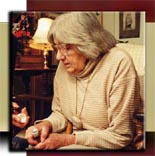Talking With Your Doctor About Cancer-related Pain Information and Support for Caregivers by The American Cancer Society ...Persistent pain can interfere with your enjoyment of life. It can make it hard to ...About one-third of patients being treated for cancer have pain. More than two-thirds of patients with advanced cancer (cancer that has spread or recurred) have pain. For these patients, controlling pain and managing symptoms are important goals of treatment. A family member or friend can have a dramatic impact on the success or failure of a pain management program for a person with cancer. The most important thing for a caregiver to remember is that pain is an individual experience that an observer cannot estimate. If people who are in pain think that others will not believe them, they may be less willing to report their pain--and remember untreated pain will often become harder to control. Each patient is unique, their pain is real, and they deserve as much pain relief as possible. It is very important the Family caregivers provide to him a complete picture of their love one’s pain history. This information will help him or her to determine the right treatment plan. Cancer pain is a common problem, but it is one that the cancer care team can treat. The team often includes a social worker, psychologist, oncology nurse, pastor, psychiatrist, medical oncologist, surgeon, and anesthesiologist. Questions to ask your doctor and pain management team include: • What can be done to relieve the pain? ...It is important to make informed decisions related to their pain management. ...While there are a variety of treatment options available for those living with pain, different therapies might not work for everyone. Finding the right combination may take time, but often makes the critical difference in the care. ...Family caregivers need to become an advocate for their love one. ...For people who are reluctant to express their needs for pain control, you can be the best advocate for insisting on good pain management. In some cases, your loved one may have to rely on you to be demanding, if necessary, to get the pain relief he or she deserves. Don’t assume the doctor or nurse knows that the patient is in pain simply because you know the person is suffering. Not everyone with cancer experiences pain. Bring up the subject with the doctor or nurse. Tell them you know pain can be treated and you want to work with them to devise a pain management plan. ...You and your loved one should be encouraged by the fact that a person’s chances of attaining good pain relief are much better today than they have been in the past. There is a large movement throughout the country to improve pain control in people with cancer, and healthcare professionals are being pressured to take pain management more seriously. ....If you are providing care to someone living with pain and you feel helpless and out of control, don’t panic. Focus on getting help for your loved one. While help is on the way or a medicine is taking hold, you can provide comfort through massage, music therapy, or just being physically and emotionally responsive to the person. Be aware of, and take care of, your own needs and feelings. Join an online support group, allow yourself to take breaks, and to rely on friends or other family members to take over the caregiving role on occasion. Take advantage of any professional support available to your and your loved. ...Caregivers often help ensure that patients receive the necessary information and understand it so that the best decision for the individual patient may be made. ...Some pain treatment options require special areas of expertise or training. Referrals to those specialists may be required. Insurance coverage of pain treatment options vary widely, if covered at all. ...For more information about and for resources available, contact the American Cancer Society at 1-800-ACS-2345 or visit their Web site at www.cancer.org We also have Spanish-speaking specialists available at 1-800-ACS-2345. You can reach one by pressing 9 on your phone after the initial message in English. |
|
| CANCER PROGRAMS AND RESOURCES | |
....THE CARING COMMUNITY – Living with Cancer (CCLC) offers WEEKLY support groups for those affected by any type of cancer. Whether you are newly diagnosed, you are undergoing treatment, or you have completed your treatment and are ready to deal with the emotional impact of a cancer diagnosis, you may want to join a cancer support group. Groups are also available for family members living with a loved one affected by cancer. English support groups are offered countywide.To register for a CCLC group, please call our bilingual line at (619) 682-2663 If you are in need of other services, such as health insurance, financial assistance, transportation, information on a specific type of cancer, clinical trials, medical equipment or prosthesis, among other things, and/or need help navigating the cancer care system, please call San Diego County Cancer Navigator’s Help-Line at (866) 324-2628 or visit our website at www.cancernavigator.org
|
|
|
|
Bienvenido a la primer revista dedicada al cuidado de la salud
 info
info
The first, the best & the only English & Spanish Magazine in San Diego, California
| CANCER |
| Cancer: What it Means to You |
| Talking with Your Doctor About Cancer-related Pain |
| LUNG CANCER |
| Lung Cancer Awareness |
| BREAST CANCER |
| Early Detection |
| SKIN CANCER |
Why You Should Know About Melanoma ....Melanoma is the most serious of the common type of skin cancer. The good news is that most melanomas can be found early and treated successfully. This brochure describes risk factors for this type of skin cancer, and important tips for finding it early.(PDF) |
| .COLON CANCER |
Colorectal cancer screening saves lives. ..If everyone aged 50 years old or older were screened regularly, up to 60% of deaths from this cancer could be avoided. >> CDC |
| March is National Colorectal Cancer Awareness Month! CMS |
| Everyday Steps to Reduce Colon Cancer Risk |
| Colorectal Cancer Testing on the Rise |
| Prevention the Focus of New Colon Cancer Screening Guidelines |
| CAREGIVING |
| How To Be an Effective Caregiver |


 sleep,work, socialize with friends and family and accomplish everyday tasks. When your ability to function is limited, you may become less productive and may be frustrated that family and friends do not always understand how you feel.. You may also find yourself avoiding hobbies and other activities that normally bring you happiness in order to prevent further injury or pain. Ongoing pain can cause you to lose your appetite, feel weak and depressed.
sleep,work, socialize with friends and family and accomplish everyday tasks. When your ability to function is limited, you may become less productive and may be frustrated that family and friends do not always understand how you feel.. You may also find yourself avoiding hobbies and other activities that normally bring you happiness in order to prevent further injury or pain. Ongoing pain can cause you to lose your appetite, feel weak and depressed.